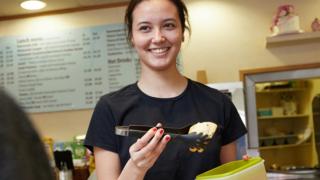Bring your own lunchbox to cut plastic waste, says charity

Image copyright
Hubbub
You might only be grabbing a sandwich, crisps and maybe a cake and coffee, but that unremarkable weekday lunch can produce four or more items of waste.
That adds up: the UK’s lunch-on-the-go habit is creating nearly 11 billion pieces of packaging every year, says environmental campaign group Hubbub.
Their solution? More packed lunches.
But if you do buy lunch, take your own container to the shop and ask them to fill it, the charity suggests.
Hubbub surveyed 1,200 UK office workers and more than half of them said they were buying takeaway lunches more than they used to five years ago, generating an estimated 276 items of waste per person per year.
“People are saying that they buying food to take out because life has got busier,” says Hubbub’s Tessa Tricks. “It’s that sense that, ‘I’m important and having this on the go will make me do things more efficiently,’ but sometimes sitting with crockery and cutlery and enjoying it would be better.”
Ms Tricks argues it is usually both healthier and cheaper to make a packed lunch, but the charity is also encouraging people to pop a plastic box in their bag alongside their reusable coffee cup, if they plan to buy takeaway food.
Hubbub says a trial in East Anglia showed that offering a 10% price reduction did persuade some customers to come prepared with their own lunch box.
Lyn McAlister who runs Cafe 7 in Norwich says the idea went down well with her customers and that she’s continuing to offer the discount even now the trial’s over.
“I think we need to keep spreading the word and hopefully other companies will come aboard too,” she says.
Image copyright
Leon
Some takeaways use recyclable packaging
Larger takeaway food chains say customers bringing in containers could present a health and safety risk. But they say they are making other moves to reduce waste.
Some, like Pret a Manger, offer water so customers can avoid buying it in bottles. Pret has also started moving its napkins and cutlery behind the counter, after a trial showed it reduced plastic cutlery usage by 30%.
The Japanese-inspired takeaway chain Itsu says it is experimenting with putting recycling bins in front of its restaurants, although it says it is proving difficult to ensure waste streams are kept uncontaminated. Anything soiled with food can’t be sent for recycling.
“We are trialling moving to bowls for all eat-in orders,” says Itsu’s spokeswoman. “These obviously will be washed and reused.”
Leon which markets itself as offering healthy fast-food says it would “love” to incentivise customers to bring in reusable containers, but there would have to be “strict controls to minimise the risk of cross-contamination”.
It points out that it already serves its food in cardboard boxes which can be composted or recycled (a removable greaseproof paper lining prevents the box being soiled) and biodegradable cutlery.
However, Hubbub’s Ms Tricks points out schemes like this fall down if customers don’t dispose of the packaging correctly.
Lunch-on-the-go “is a recycling minefield” she says, because by its nature it is often being taken away from the point of purchase. And out on the street or back in the office there isn’t often the infrastructure to support recycling and composting.

